
Gripla
metrics 2024
Cultivating Knowledge at the Intersection of Language and Culture
Introduction
Gripla, published by the Arni Magnusson Institute for Icelandic Studies, stands as a significant academic journal in the fields of linguistics and literary studies. With an ISSN of 1018-5011, this esteemed journal has been releasing cutting-edge research since its inception in 2011. Although currently categorized as Q4 in Linguistics and Language and Q3 in Literature and Literary Theory for 2023, it has showcased robust scholarship with a Scopus rank of #327 in Literature and Literary Theory, placing it within the 70th percentile of its category. Gripla serves as a vital platform for the exploration of Icelandic studies, fostering a deeper understanding of language and literature in a rapidly evolving academic landscape. While it is not an open-access journal, its contributions are essential for researchers, professionals, and students eager to engage with new developments in the linguistics and literary discourse. Situated in the heart of Reykjavik, Gripla continues to enrich the scholarly community by providing insights that bridge traditional knowledge with contemporary relevance.
Metrics 2024
 0.10
0.10 0.20
0.20 0.20
0.20 5
5Metrics History
Rank 2024
Scopus
JCI (Web Of Science)
Quartile History
Similar Journals
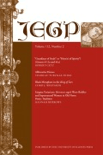
JOURNAL OF ENGLISH AND GERMANIC PHILOLOGY
Cultivating Knowledge in English and Germanic PhilologyJournal of English and Germanic Philology, published by University of Illinois Press, stands as a prestigious forum for scholarly discourse in the fields of linguistics and literary studies. With its ISSN 0363-6941 and an impressive impact factor aligning it within the Q1 and Q2 quartiles in key academic categories, this journal delves into nuanced explorations of both the English and Germanic languages, enriching the understanding of language and its literary frameworks. The journal aims to foster interdisciplinary dialogue, offering cutting-edge research that appeals not only to linguists and literary theorists but also to educators and cultural historians alike. Although the journal is not open access, its contributions are essential for anyone keen on enhancing their knowledge of linguistic phenomena and literary narratives from these influential linguistic traditions. With a commitment to publishing innovative and rigorous scholarship, the Journal of English and Germanic Philology is a vital resource for academics seeking to advance their work in language and literature.
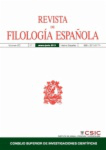
REVISTA DE FILOLOGIA ESPANOLA
Exploring the Depths of Spanish Linguistics and LiteratureREVISTA DE FILOLOGIA ESPANOLA is a distinguished academic journal dedicated to the fields of linguistics and literature, published by the CONSEJO SUPERIOR INVESTIGACIONES CIENTIFICAS (CSIC) since 1954, and has been an Open Access journal since its inception. Situated in Madrid, Spain, this journal has emerged as a crucial platform for the dissemination of scholarly research, with notable rankings including Q2 in Linguistics and Language and Q1 in Literature and Literary Theory as of 2023. The journal's commitment to fostering academic dialogue is reflected in its impressive Scopus rankings, including a 79th percentile in the Arts and Humanities for Literature and Literary Theory. Covering a wide range of topics from linguistic theory to literary critique, REVISTA DE FILOLOGIA ESPANOLA is essential reading for researchers, professionals, and students alike, providing valuable insights and cutting-edge research in the ever-evolving landscape of Spanish philology.

AEVUM-RASSEGNA DI SCIENZE STORICHE LINGUISTICHE E FILOLOGICHE
Advancing Historical Linguistics and Philological Insights.AEVUM-RASSEGNA DI SCIENZE STORICHE LINGUISTICHE E FILOLOGICHE is a distinguished academic journal published by VITA PENSIERO, based in Italy, focusing on the intricate fields of historical linguistics, philology, and cultural studies. With ISSN 0001-9593 and E-ISSN 1827-787X, it has been a significant contributor to scholarly discourse since its inception in 1979, with publications dating from 2001 to 2020 and from 2022 to 2023. Although it is categorized in Quartile Q4 across various disciplines including History, Linguistics, Literature, and Philosophy for the year 2023, AEVUM serves as a vital platform for nurturing discourse and advancing research in its fields, particularly appealing to scholars and professionals seeking to explore the intersections of language and culture. While the journal is not open access, it continues to maintain academic rigor and relevance, encouraging contributions that reflect current trends and theoretical developments. Researchers and students alike can benefit from its rich repository of language and historical research, drawing connections that contribute to a profound understanding of human society through the lens of language.

Biblical Annals
Cultivating Knowledge at the Intersection of Faith and ResearchBiblical Annals is an esteemed peer-reviewed journal published by the John Paul II Catholic University of Lublin, specializing in the field of Religious Studies. With a significant impact factor and an impressive Q1 ranking in the 2023 quartiles, this journal has established itself as a leading platform for scholarly discourse and research. Since its transition to Open Access in 2011, it has broadened its reach and accessibility, allowing researchers and academics to engage with its rich content without barriers. The journal's focus encompasses critical analysis, interdisciplinary studies, and contemporary issues relating to biblical texts and traditions, making it a vital resource for students, professionals, and researchers alike. Located in Lublin, Poland, Biblical Annals serves as a bridge connecting global perspectives on faith, culture, and spirituality, fostering an ongoing dialogue that enriches the understanding of religious phenomena.
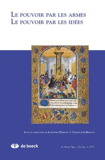
MOYEN AGE
Navigating the Intersections of History and LanguageMOYEN AGE is a distinguished academic journal published by LE MOYEN AGE BOECK & LARCIER S A in Belgium, focused on the multifaceted disciplines of History, Linguistics, and Literature. With its ISSN 0027-2841 and E-ISSN 1782-1436, this journal serves as a platform for researchers, professionals, and students alike to engage with scholarly articles that contribute to the understanding of medieval studies. Although currently categorized in the fourth quartile across various fields as of 2023, MOYEN AGE demonstrates a commitment to fostering academic dialogue and exploration around historical linguistics and literary theory. The journal is available via subscription, making it an essential resource for those looking to deepen their knowledge in its scope, which spans from 2001 through 2024. As it continues to evolve, MOYEN AGE remains a relevant source for emerging thinkers and established scholars drawn to the complexities of the medieval era.
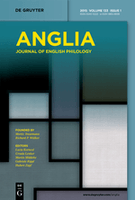
ANGLIA-ZEITSCHRIFT FUR ENGLISCHE PHILOLOGIE
Unveiling the Evolution of the English LanguageANGLIA-ZEITSCHRIFT FUR ENGLISCHE PHILOLOGIE, published by WALTER DE GRUYTER GMBH, stands as a significant periodical in the fields of Linguistics and Literary Theory. With a rich publication history dating back to 1878 and ongoing contributions until 2024, this esteemed journal serves as a vital resource for researchers, professionals, and students interested in the evolution of the English language and literature. Although it does not currently offer open access, its rigorous peer-reviewed articles have secured a respectable standing, ranking Q3 in Linguistics and Language and Q2 in Literature and Literary Theory as of 2023. The journal, located in Berlin, Germany, continues to drive academic discourse and foster scholarly engagement in the intricacies of English philology, making it an essential platform for the latest research and developments in the field.
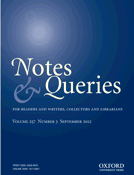
NOTES AND QUERIES
Illuminating Textual Nuances Through Scholarly DialogueNOTES AND QUERIES is a prestigious journal published by Oxford University Press, dedicated to the exploration of literary studies, linguistics, and library sciences, with a history that extends back to 1849. This journal serves as a pivotal platform for scholars and practitioners to engage in dialogues that illuminate the nuances of text interpretation and linguistic inquiry. With its emphasis on both new research and critical discussion, NOTES AND QUERIES is indexed with notable Scopus rankings, reflecting its substantial contribution to the fields of Linguistics and Literary Theory. Although it currently resides in the Q4 quartile for Library and Information Sciences and Linguistics and Language, and Q3 for Literature and Literary Theory as of 2023, it remains a vital resource for both emerging and established scholars aiming to deepen their understanding of cultural and textual contexts. While the journal is not open access, it continues to foster an environment for scholarly collaboration and knowledge dissemination, making it an essential read for anyone invested in the arts and humanities.

Carte Romanze
Championing Open Access to Literary ScholarshipCarte Romanze is a prominent academic journal published by Milano University Press, dedicated to the field of literature and cultural studies. With an ISSN of 2282-7447, it offers an invaluable platform for researchers, professionals, and students interested in exploring the rich landscapes of narrative and cultural expression. Since its transition to Open Access in 2013, the journal has championed the dissemination of knowledge, making high-quality research freely available to a global audience. Situated in the historic city of Milan, the journal aims to foster interdisciplinary dialogue and innovation in literary scholarship while maintaining rigorous academic standards. As it continues to contribute to the landscape of contemporary literature studies, Carte Romanze is poised to inspire new scholarly conversations and ideas.
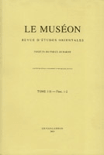
Museon
Connecting Ideas Through Rigorous Academic InquiryMuseon, published by PEETERS in Belgium, is a prominent academic journal dedicated to exploring the interconnected realms of History, Linguistics, Literature, and Religious Studies. With an ISSN of 0771-6494 and an E-ISSN of 1783-158X, this journal has been a reliable source of scholarly discourse since its inception in 1972, with coverage extending from 1976 to 2023. While the journal does not offer open access, it maintains a respectable reputation, as evidenced by its category quartile rankings in 2023, positioning it in Q2 for Literature and Literary Theory and Q3 for the other disciplines. Researchers and students in these fields will find Museon to be an essential platform for disseminating and engaging with innovative and critical analyses. The journal's commitment to high-quality scholarship is reflected in its diverse scope and its ongoing contribution to the humanities, making it a vital resource for advancing knowledge and fostering academic dialogue.

Listy Filologicke
Cultivating a Nexus for Innovative Academic Exploration.Listy Filologicke is a distinguished academic journal published by the Institute of Classical Studies at the Academy of Sciences of the Czech Republic, focusing on the interdisciplinary fields of History, Linguistics and Language, and Literature and Literary Theory. With an ISSN of 0024-4457 and an E-ISSN of 2570-9410, this journal has been a pivotal platform for scholarly discourse since its convergence years began in 2003. Notably, it holds a Q3 classification in History and Linguistics and Language, and a Q2 in Literature and Literary Theory as of 2023. Its rankings within Scopus illustrate its relevance and impact in academia, with noteworthy positions in the Arts and Humanities and Social Sciences categories. Researchers, professionals, and students will find Listy Filologicke an invaluable resource for exploring cutting-edge research, critical analyses, and discourse that contribute significantly to their respective fields. Based in the heart of the Czech Republic, it continues to promote scholarly excellence and foster international collaboration.